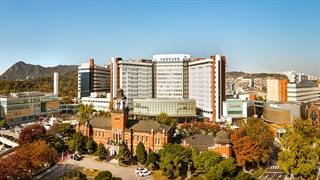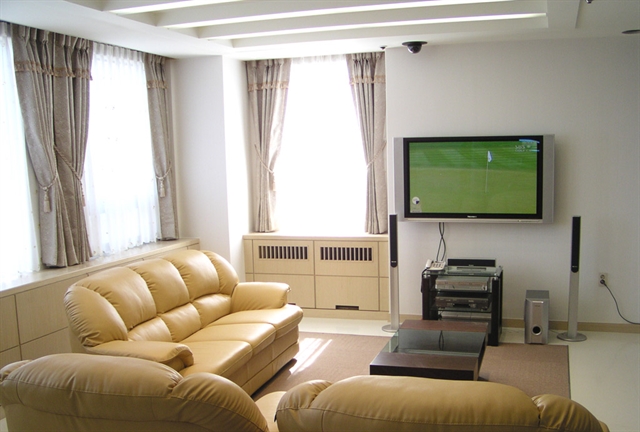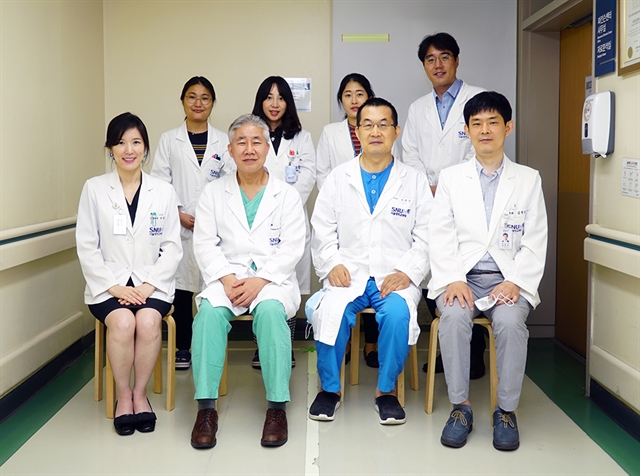 VOLUME 26, ISSUE 3 • SEPTEMBER 2022 Full issue »
VOLUME 26, ISSUE 3 • SEPTEMBER 2022 Full issue »

My Center: The Movement Disorder Center of Seoul National University Hospital in Seoul, Republic of Korea
 “My Center” is a dedicated article in each Moving Along issue about unique Movement Disorders Centers around the world.
“My Center” is a dedicated article in each Moving Along issue about unique Movement Disorders Centers around the world.
Each article will showcase an exclusive center from a specific region to highlight its dedication to movement disorders with particular strengths in research, community outreach or patient care.
The Movement Disorder Center (MDC) of the Seoul National University Hospital (SNUH) is a specialized center for Parkinson’s disease (PD) and other movement disorders (MDs) in the central national hospital, which is in Seoul, the capital and the largest city of Republic of Korea. The multidisciplinary team is comprised of twelve staff members from neurology, neurosurgery, psychiatry and rehabilitation medicine. It was established with the purpose of comprehensive treatment, clinical and basic research for PD and other MDs, and education of domestic and foreign MD experts and patients.
The SNUH MDC operates a MD outpatient clinic and provided more than 11,000 visits for patients with PD and MDs in 2021. At botulinum toxic clinic, more than 30 patients with blepharospasm, hemifacial spasm and dystonia are treated every week. As an advanced surgical service, we have been performing deep brain stimulation for patients with PD and severe dystonia since 2005, and magnetic resonance-guided focused ultrasound for patients with intractable tremor since 2021.
The MD monitoring system for inpatients was established in 2005. It is a specialized ward resembling a usual living room, equipped with six high-resolution monitoring video cameras running 24 hours to record and analyze patients’ movement. Using this system, we can evaluate the PD patient’s motor fluctuations and dyskinesias more accurately and select appropriate patients for deep brain stimulation. In addition, this system is used for medication adjustment for PD, patient education, and diagnosis of paroxysmal movement disorders and functional movement disorders.

The MDC has been training MD experts in Korea through a clinical MD fellowship program for clinical approach, diagnosis, treatment, surgical patient management and research. Twenty-three MD specialists and 16 neurosurgeons have been trained in this program since its establishment. The center also has fostered international fellows from countries such as China and Philippines. Before the COVID-19 pandemic, the center had implemented a regular education program to help patients and caregivers understand PD. In addition, the center has been the site for MDS-AOS regional education courses several times since 2015, covering various topics such as 'Deep Brain Stimulation for Movement Disorders,' 'Neuropathology of Movement Disorders' and 'Basic and Clinical Science.' These courses were very successful and contributed to education and communication of MD specialists in the AOS region.
Research on patients with PD and other MDs is one of the core activities of the SNUH MDC. The center has been conducting basic and clinical studies, industry-sponsored and investigator-initiated clinical trials, biomarker studies using blood and tissues using biosamples deposited at the SNUH biobank to develop new diagnostic methods, imaging analysis, pathologic studies, international collaborative studies, and longitudinal cohort studies. The introduction of artificial intelligence is also spurring research into new diagnostic techniques for evaluation of patients using video or electrophysiologic data.

Through these activities, we are doing our best to help patients with PD and other MDs receive better treatment in the SNUH MDC.
Read more Moving Along:






